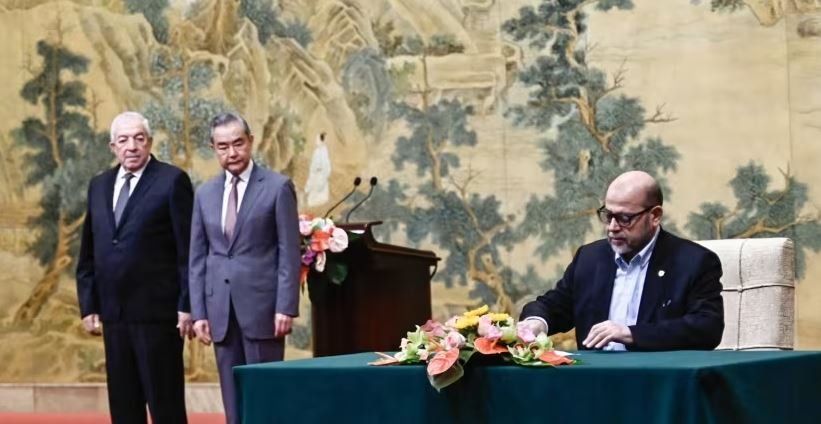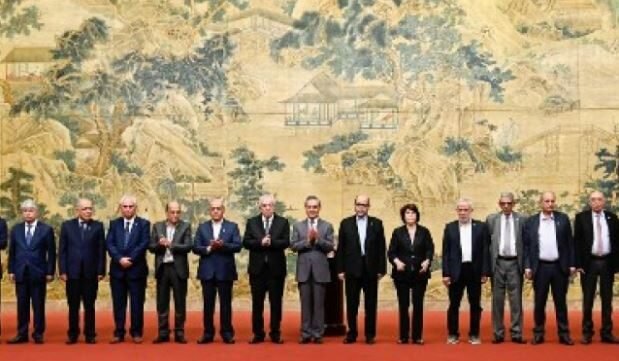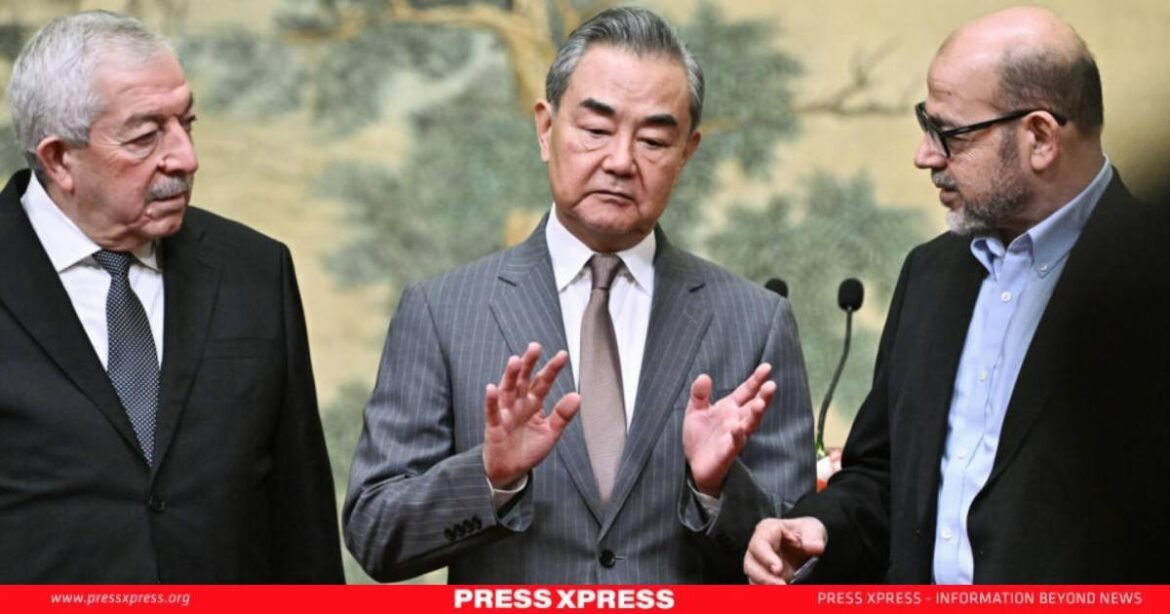Palestinian factions have reached a significant agreement in Beijing, signing a ‘national unity’ accord aimed at ensuring Palestinian governance of Gaza following the conclusion of Israel’s current military campaign in the enclave.
The agreement, finalized on Tuesday after three days of intensive negotiations in China, establishes the framework for an ‘interim national reconciliation government’ to administer Gaza in the post-war period, as announced by Chinese Foreign Minister Wang Yi. Notably, long-standing rivals Hamas and Fatah, along with 12 other Palestinian groups, signed the accord, marking a potential turning point in inter-Palestinian relations.
You can also read: Who could be Kamala Harris’s Running Mate?
Mousa Abu Marzouk, a senior Hamas official, emphasized the importance of the agreement at a press conference in Beijing, stating, “Today we sign an agreement for national unity and we say that the path to completing this journey is national unity.”
‘Concrete than any other previous deals’
Mustapha Barghouti, secretary-general of the Palestinian National Initiative, one of the 14 factions involved in the accord, described the agreement as more comprehensive than any previous reconciliation attempts in recent years, reports Al Jazeera.
He outlined four key components of the deal: the establishment of an interim national unity government, the formation of a unified Palestinian leadership in preparation for future elections, the free election of a new Palestinian National Council, and a general declaration of unity in response to ongoing Israeli military actions.
Barghouti emphasized the strategic importance of moving towards a unity government, asserting that it “blocks Israeli efforts to create some sort of collaborative structure against Palestinian interests.” This reconciliation between Hamas and Fatah could potentially reshape internal Palestinian dynamics, as the two major Palestinian political parties have been embroiled in a bitter rivalry since 2006 when Hamas took control of Gaza following a conflict.

Abu Marzouk, quoted by CNN, described the current situation as a ‘historic junction’, adding that “Our people are rising in their efforts to struggle.” The agreement brings together groups with differing approaches to the conflict with Israel: Hamas, which was behind the October 7 attack on Israel, advocates for armed resistance against Israeli occupation, while Fatah, which controls the Palestinian Authority and has partial administrative control of the occupied West Bank, favors peaceful negotiations to achieve a Palestinian state.
Despite several failed reconciliation attempts in the past, the ongoing war in Gaza has intensified calls for Palestinian unity, particularly as Israel and its allies, including the United States, discuss potential governance structures for the enclave after the conflict. Israel has strongly opposed any role for Hamas in Gaza’s future administration, indicating its intention to maintain military control for the foreseeable future.
‘No other way’

Barghouti identified the war in Gaza as the primary factor driving Palestinian factions to set aside their differences. He stressed, “There is no other way now but for Palestinians to be unified and struggle together against this terrible injustice,” adding that implementation of the agreement is now crucial.
China, which has been seeking to play a mediating role in the conflict, previously hosted talks between Fatah and Hamas in April. During those discussions, both parties expressed willingness to achieve reconciliation through dialogue and made progress on various issues, according to Chinese Ministry of Foreign Affairs spokesman Lin Jian.
The recent negotiations in Beijing included high-level representation, with Hamas’s political leader Ismail Haniyeh, and Fatah’s deputy head Mahmoud al-Aloul participating. Following the signing of the ‘Beijing Declaration’, Chinese Foreign Minister Wang Yi commented on the international dimension of the reconciliation process, stating, “Reconciliation is an internal matter for the Palestinian factions, but at the same time, it cannot be achieved without the support of the international community.”
China has historically maintained a sympathetic stance towards the Palestinian cause and has consistently supported a two-state solution to the Israel-Palestine conflict. In line with this position, Chinese President Xi Jinping has called for an ‘international peace conference’ to bring an end to the current war.
This agreement represents a significant development in Palestinian politics and could have far-reaching implications for the future of Gaza and the broader Israeli-Palestinian conflict. However, the effectiveness of this unity pact will ultimately depend on its implementation, a challenge that has hindered previous reconciliation efforts.


